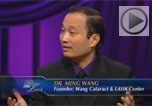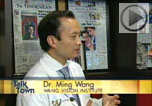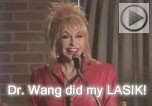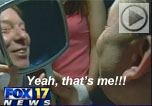- Over 55,000 LASIK and cataract procedures (including on over 4,000 doctors)
- The FIRST center in TN to offer Laser Cataract Surgery
- Introduced bladeless all-laser LASIK to the state
- Implanted the state's first FOREVER YOUNG™ Lens
- The first surgeons in the US to perform a new Intacs surgery to treat keratoconus
- Helped patients from 40 states and 55 countries
- International referral center for cataract surgery and LASIK complications
- Read Dr. Wang's book: LASIK Vision Correction
Why did you decide to have LASIK? Why did you choose Dr. Wang? How has your life changed since your LASIK procedure?
What is your advice for people considering LASIK?
Click to read more
| Article Library | Print This Page |
Social media sorely lack the element of dependability
By Ming Wang, Wang Vision 3D Cataract and LASIK Center, Nashville, Tennessee
![]()
Tennessee Voices
To view the the pdf copy of this article, click here.
The popular view is that traditional media sources, such as the newspaper, will decrease in influence as significant sources of information due to the ever-increasing importance of social media (blogs, chat rooms, e-community).
My opinion, however, is different. I believe there are basic and yet valuable fundamentals of human communication and information exchange for which traditional media sources will always play an important role, one that cannot be replaced by social media. An example of this is the reader's need to check the validity, credibility and authenticity of the source of the information.
As human beings, the first thing we do when we hear a story is check its legitimacy. We tend to believe the words of someone whom we have known for a while, or a newspaper reporter who has had a good track record. An editor or a reporter stands by his or her reporting, and a newspaper tells you who investigated a story, what happened and the source of the information being reported (most of the time). With social media, when one hears a comment in a chat room or e-community, often there is no way to get any real sense of who the communicator is, to what degree he or she should be believed and the source of the information.
So, although social media provide a lot of information in an open format, the fundamental cornerstone of human interaction can perhaps never be established.
Furthermore, over-reliance on social media could have a harmful long-term effect. We may become desensitized to and less discriminating about the legitimacy of information we receive .
Our instinct to guard against false information has gradually decreased. Hence, when one reads a story on the Internet or in a chat room, one tends to believe it, without feeling the need for due diligence about its reliability. We need to develop a heightened sense of alertness and caution toward these social media sources, not blindly believing what we read without carefully checking the validity of the information before forming an opinion about it.
This key ingredient that social media lack and traditional media possess shows that the content of communication can have little effect if we question its truthfulness. So reasonable credibility and reliability, acquired through traditional media sources such as a newspaper, can never be replaced by social media sources due to their very nature and format.
Our new texbooks
A 501c(3) charity that has helped patients from over 40 states in the US and 55 countries, with all sight restoration surgeries performed free-of-charge.




















